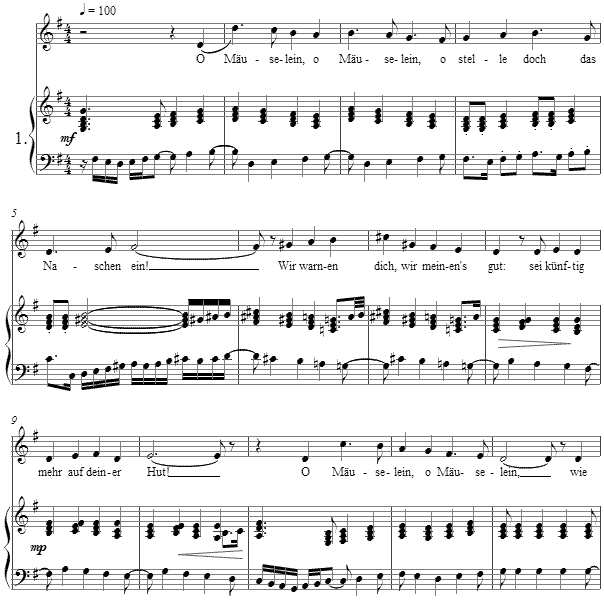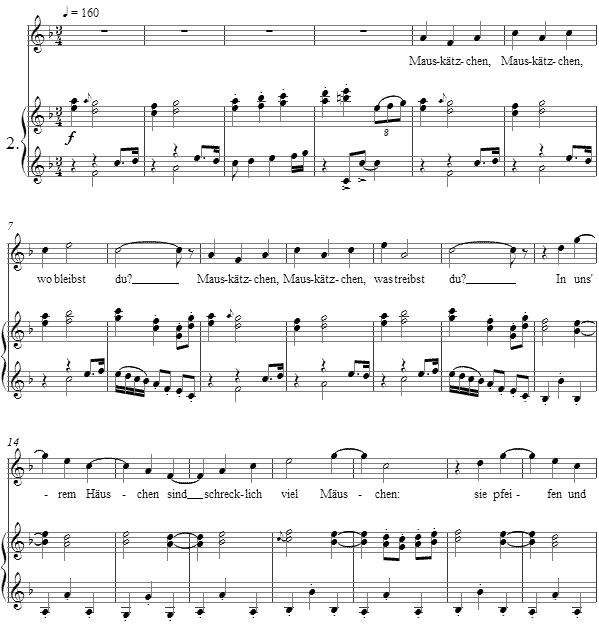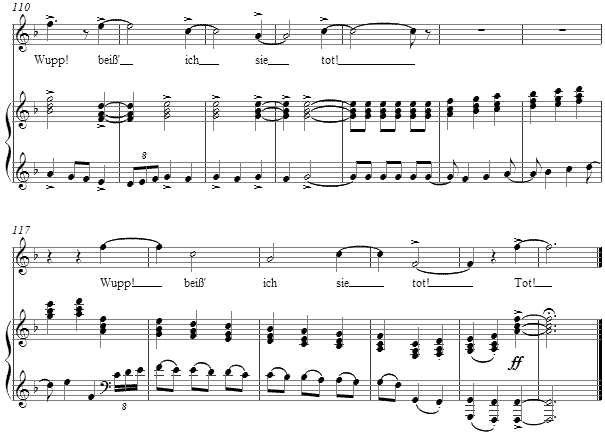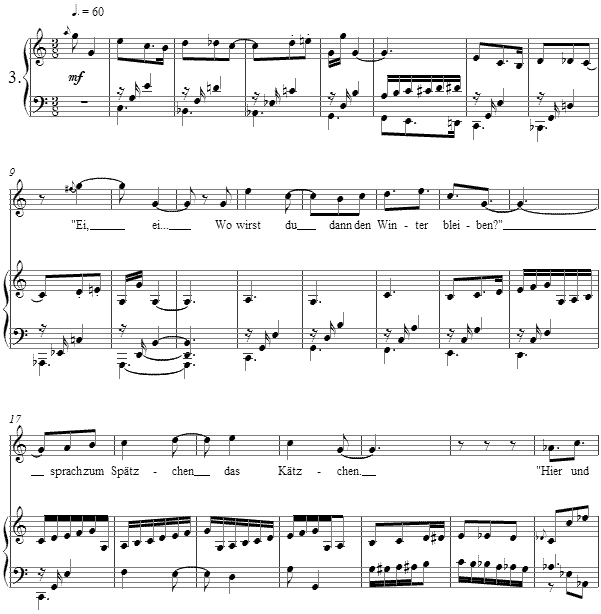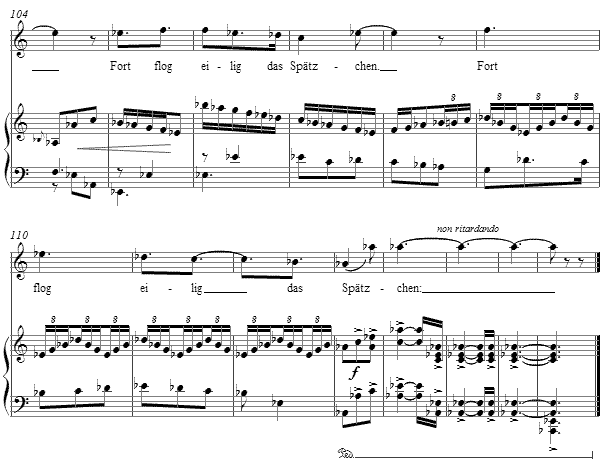Music and Texts of GARY BACHLUND
Vocal Music | Piano | Organ | Chamber Music | Orchestral | Articles and Commentary | Poems and Stories | Miscellany | FAQs
Mäuselein, Mauskätzchen und Spätzchen - (2007)
Drei Lieder von Hoffmann von Fallersleben
for high voice and piano
i. O Mäuselein [ 4 pages, circa 2' 45" ]
O Mäuselein, o Mäuselein,
O stelle doch das Naschen ein!
Wir warnen dich, wir meinen's gut:
Sei künftig mehr auf deiner Hut!
O Mäuselein, o Mäuselein,
Wie wird es dir ergehen!
O Mäuselein, o Mäuselein,
Geh' in die Ecke nicht hinein!
Es stehet eine Falle da,
Die aufgestellt hat der Papa.
O Mäuselein, o Mäuselein,
Wie wird es dir ergehen!
Das Mäuselein, das Mäuselein,
Das schlüpfet in die Fall' hinein.
Wipp wapp! da fällt die Falle zu,
Gefangen ist es da im Nu.
O Mäuselein, o Mäuselein,
Nun ist's um dich geschehen!
ii. Mauskätzchen [ 5 pages, circa 2' 20" ]
Mauskätzchen; wo bleibst du?
Mauskätzchen, was treibst du?
In unserem Häuschen
Sind schrecklich viel Mäuschen:
Sie pfeifen und rappeln,
Sie trippeln und trappeln
In Kisten und Schränken,
Auf Tischen und Bänken;
Sie stehlen und naschen
Und will man sie haschen:
Wupp! sind sie fort!
Du rufst mich, da bin ich!
Sei still, nun beginn ich
Ein Tänzchen mit allen,
Das soll dir gefallen.
Erst sitz' ich,
Dann schleich' ich,
Dann nah' ich,
Dann weich' ich,
Dann leg' ich mich nieder,
Dann heb' ich micht wieder,
Dann schwing' ich mein Schwänzchen
Und schnurre zum Tänzchen,
Wupp! sind sie da!
Sie tanzen im Kreise
Auf närrische Weise,
Hopp heiße! so munter
Hinauf und herunter.
Dann fass' ich beim Ohr sie,
Dann werf' ich empor sie;
Und fallen sie nieder,
Dann fang' ich sie wieder.
Und will dann die Maus doch
Nun endlich ins Mausloch -
Wupp! beiß' ich sie tot!
iii. Spatz und Katze [ 4 pages, circa 2' 20" ]
"Wo wirst du denn den Winter bleiben?"
Sprach zum Spätzchen das Kätzchen.
"Hier und dorten, allerorten",
Sprach gleich wieder das Spätzchen.
"Wo wirst du denn zu Mittag essen?"
Sprach zum Spätzchen das Kätzchen.
"Auf den Tennen mit den Hennen",
Sprach gleich wieder das Spätzchen.
"Wo wirst du denn die Nachtruh' halten?"
Sprach zum Spätzchen das Kätzchen.
"Laß dein Fragen, will's nicht sagen",
Sprach gleich wieder das Spätzchen.
"Ei, sag mir's doch, du liebes Spätzchen!"
Sprach zum Spätzchen das Kätzchen.
"Willst mich holen - Gott befohlen!"
Fort flog eilig das Spätzchen.[ 13 pages, circa 7' 05" ]
Hoffmann von Fallersleben
August Heinrich Hoffmann von Fallersleben (1798-1874) shortened his name to Hoffmann von Fallersleben as his nom de plume. He is best known for writing "Das Lied der Deutschen" also known as "Das Deutschlandlied," which is now the national anthem of Germany, as well as a number of popular children's songs. He was a highly productive writer and scholarly editor. While he was a student at the University of Göttingen (1816-19) he made the acquaintance of the Grimm brothers, whose influence, especially that of Jacob Grimm, shows in his own works and in his lifelong preoccupation with folk literature. After further studies in Bonn (1819-21) and time in Berlin (1821-23), Hoffmann obtained a position in Breslau, Poland, where he remained for twenty years (1823-43), appointed to a professorship in German language and literature. He quickly had a long list of professional publications to his credit, along with successful collections of his own poetry. Hoffmann was also an outspoken political liberal who supported the growing unrest against the aristocracy in various German-speaking lands. Once he published his supposedly "nonpolitical songs," Unpolitische Lieder (1840-41), which are in effect politically highly charged, he was deprived of his chair and professorship in 1842 and banishment from Prussian lands followed thereafter.
During this exile, he traveled widely in Germany, Switzerland and Italy, and lived for two or three years in the city of Mecklenburg, of which he became a naturalized citizen. After the revolution of 1848 he was enabled to return to Prussia, where he was restored to his rights, and received the salary attached to a promised office not yet vacant. He married in 1849, and during the next ten years lived first in Bingerbrück, afterwards in Neuwied, and then in Weimar, where together with Oskar Schade (1826-1906) he edited the Weimarische Jahrbuch (1854-1857). In 1860 he was appointed librarian to the Duke of Ratibor at the monasterial castle of Corvey near Höxter on the Weser, where he died in 1874.
A humorous side to his work for Americans is his collection of thirty-one songs, Texanische Lieder (1846). In order to circumvent censorship regulations, Hoffmann had the title page state that the book was written by German Texans and published in San Felipe, Texas, by "Adolf Fuchs & Co.," whereas it actually was published in Wandsbeck, Germany.
These three poems for children are humorous, as the author takes sides, first empathizing with the mouse, then cheering the death of mice at the hands of the cat, and finally a sparrow's wise escape from a cat.
In "O Mäuselein," the parallel triad in root position is opposed by the syncopated bass line as the anxiety for a mouse is seen through the eyes of the child.
The author then shows us a different perspective as the "mouser" cat is encouraged to hunt the "many awful mice" which infest a house. Herein the parallel fourths in the right hand play the top part in parallel triads with the left hand voice adding more filigree.
As the setting draws to a close, we find the enthusiasm is for the cat's successful killing of the mice. That the first text and this seem opposite is a part of the normal life of a child, as learning goes on. Sympathy for a pest gives way to more practical considerations, and finally enthusiasm at the opposite sentiment.
The last setting places the cat in C major as it tries to lure the sparrow with questions and more questions. The sparrow each time moves to A flat in order to avoid the cat and its C major. The cat's "ei, ei" drawn from later in the text begins the song.
Avoiding the cat's repeated questions rooted in C major, the song setting ends with the sparrow's flight and remains therefore solidly in A flat major, a triplet gesture heightening the "flight" from the cat, who is left to seek its dinner elsewhere -- perhaps with yet more mice?
The score for Mäuselein, Mauskätzchen und Spätzchen is available as a free PDF download, though any major commercial performance or recording of the work is prohibited without prior arrangement with the composer. Click on the graphic below for this piano-vocal score.
Mäuselein, Mauskätzchen und Spätzchen

